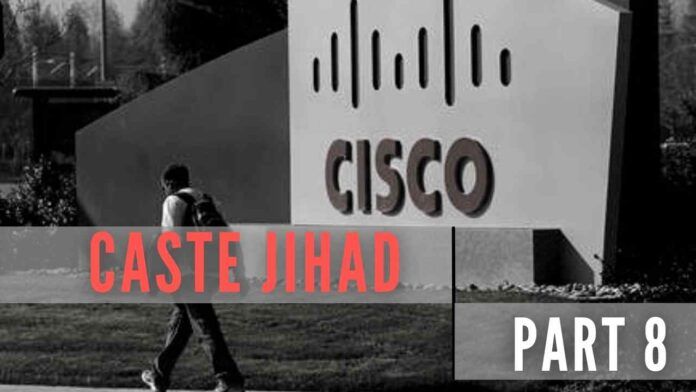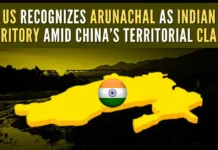
The previous 7 parts of the article can be accessed here Part 1, Part 2, Part 3, Part 4, Part 5, Part 6, Part 7. This is the eighth part
Alleged caste discrimination in high-tech areas in the U.S.
In the last part, several cases of alleged caste-based discrimination in the non-high-tech sectors were discussed. One of those cases was about the BAPS temples with a potential for serious consequences. However, the alleged discrimination in the infamous case of John Doe versus Cisco has an even higher potential of irreparable damage for a large number of Indians (and South Asians), irrespective of their caste, employed in the high-tech industry[1]. We strongly condemn any type of discrimination but the strong activism by a number of organizations smells like caste Jihadism. The misplaced activism seems to even discredit Dr. B R Ambedkar who fought for the Dalit cause enabling their education, employment, and economic upliftment. This article will discuss the Cisco case and its impact, more reported complaints in other high-tech workplaces, and why the activists should be in an advocacy role for the greater good.
Let us acknowledge that no employee should be subjected to harassment, demeaning actions, and/ or bullying yet the truth is that such unfortunate things happen. Everyone has the right and deserves to feel safe and respected which necessitates a high degree of mutual trust and ethical conduct. Any time an employee reports any act of aggressive, intimidating, threatening, and/ or marginalization, it must be addressed and dealt with fairly and promptly.
The Cisco case filed by California’s Department of Fair Housing and Employment (DFHE) alleged that the hiring manager of Indian origin of the higher caste discriminated against a team member of the lower caste Dalit (also of Indian origin)[1]. The discrimination case initially filed in the Federal Court is now back with the state court of California. Cisco denies the allegations and promises to defend the charges as best as possible. Reportedly, the accuser was a student at IIT where his supervisor (also an IITian) was aware of his admission to IIT under the reservation system. The lawsuit names Sundar Iyer and Ramana Kompella (Iyer was the first supervisor who has stepped down since and was replaced by Kompella).
The Cisco case has become a legal battle of much greater significance to the broader Hindu community and also has potential for negative consequences for the Indian-origin workforce in the high-tech industry in Silicon Valley. It is shaping to be a battle similar to Blacks versus Whites in the U.S. heightening the racial (casteism) tone and tensions from an ancient transnational issue of Dalits not being treated well. It is important to note that caste-based discrimination is now legally prohibited in India but the silent and subtle discrimination continues as it does in the U.S. despite the protections under Title VII. It is the sad truth that human beings carry unintended biases and prejudices which manifest in the workplace knowingly or unknowingly.
The U.S. Hindu community represented by Hindu American Foundation (HAF) states, “California has unconstitutionally defined Hindu religious doctrine, and perpetuated false and dangerous stereotypes equating caste-based discrimination with Hinduism and Hindus[2].” Another Hindu organization, CoHNA, has also taken a stand against the lawsuit and caste-based discrimination[3]. In my opinion, the allegations by DFHE based on their implicit claim to understand India’s complex Varna and caste system are neither true nor accurate. I believe that HAF and CoHNA teams have a deeper and better understanding of India’s varna/ caste system and DFHE’s assertion that the caste is based on strict Hindu social and religious hierarchy is unfounded. DFHE and/ or the court must invite HAF, CoHNA, or both to offer their point of view in the Cisco case.
Reportedly, it is not only the Equality Labs (EL) assisting DFHE but many more have come forward to offer amicus curiae (advising as the friends of the court). These organizations include the Ambedkar International Center, Ambedkar King Study Circle, Anti Caste Discrimination Alliance, Boston Study Group Inc., Ambedkarite Buddhist Association of Texas, Dr. B R Ambedkar International Mission Center, Ambedkar Educational Aid Society, Shri Guru Ravidass Sabha of Bay Area, International Bahujan Organization CA, and Hindus for Human Rights among others.[4]
Collectively, they appear to be fighting for social justice on behalf of Dalits (also called untouchables) who were historically wronged in India. Their overarching goal is to have ‘caste’ as a protected category under Title VII. What remains unclear, however, is why these socially uplifted and educated Indians (Dalits or broadly SC/ STs) are waging a “fight” against fellow Indians (of upper caste) in the U.S.? The presently accused and the accuser has very little to do with the historic and inexcusable wrongs done to Dalits in India. If anything, the historical wrongs should be dealt with in the Indian courts and/ or India’s political/ social structures where significant amends are already showing a steady change for the better. An indicator of progress is better access to education and employment (the reservation) for SC, ST, and OBCs in all government institutions and departments. It is already enabling them to hold socially respectable and responsible positions in the community.
I wonder what Ambedkar, an architect of India’s constitution and a defender of Dalit’s rights, would think of the activists from his community who are currently in the U.S.? Most of them are the product of a system that he had helped create yet they are fighting against that very system and that too beyond India’s borders. I surmise that Ambedkar would rather celebrate the success of the system enabling Dalits to move up the success ladder. He is perhaps very pleased, looking down from the Heavens, that his fellow Dalits are now studying at Harvard and other elite institutions and/ or are part of the workforce in respectable organizations/ corporations.
On the contrary, many organizations named after him (listed above) are discrediting his statesmanship, ideals, and the cause he stood for. These organizations can better serve the community by advocating for dialog, debate, and discussion to promote mutual trust, respect, and honorable conduct. Their advocacy can go further by coaching and advising the H.R. departments where employees are feeling disrespected, harassed, and/ or discriminated without the confrontational actions and activism leading to unwarranted “us versus them.”
In my view, the race for the “caste” to be included as a protected category under Title VII may be a futile effort of equating caste (Dalit) to race (Black). Such activism will unduly raise the non-existent caste culture in the U.S. as a new paradigm. Any efforts of associating Dalit cause to BLM-like movements may backfire in the long run with one group of Indians playing the victim card against another. We should be proud of ourselves as a model immigrant community rather than inciting deep divisions among us.
I am afraid that if the debate on the caste issue is unduly prolonged in the media, society, courts, and workplaces, Dalits themselves may become the victims of the implicit and unspoken bias and are deemed “troublemakers.” Often, the perceptions become reality. Also, Indians and South Asians at large will likely suffer consequences because the employers may not want them because of their ‘caste baggage’. Employers are often reluctant in hiring non-immigrant visa workers like H1B to avoid lengthy and costly immigration headaches. Why would they hire anyone with added adjectives like a troublemaker and/ or caste-baggage? Won’t it be wiser for all to go from activism to advocacy and remain engaged in the most professional, ethical, and harmonious conduct to not let our diversity become divisive in the U.S.?
While the Cisco case is pending and the high-tech industry awaits the outcome, the EL continues to be engaged in more activism. It is reported that within a matter of weeks after the Cisco case was filed, “more than 250 Dalits from Google, Facebook, Microsoft, Apple, Netflix, and dozens of others in Silicon Valley have come forward to report discrimination, bullying, ostracization, and even sexual harassment by colleagues who are higher-caste Indians[5].” While the details are not known about these allegations, it is not unusual that about 250 complainants felt discriminated/ harassed considering tens of thousands of high-tech employees of Indian origin in Silicon Valley.
Every individual has the right to express her/ his emotions, lack of respect and trust, and perceived discomfort in the workplace. Once found, these must be dealt with immediate corrective measures through advocacy with the respective H.R. departments. However, the EL is unduly hyping casteism as a means to creating “fear” for the H.R. offices, the hiring managers, and South Asian communities at large. Is it not unethical on the part of the EL that they collect data, create fear, and then promote themselves as the savior of Dalits? In the end, EL wants to be known as the best consulting agency and the source for offering professional training about Dalit issues in the workplace?
In my informed view, there is no evidence for widespread caste-based discrimination in the high-tech industry except isolated legal cases and/ or complaints. The activism by the EL and other organizations are exploiting casteism, promoting caste-jihad, and devaluing cultural diversity as a divisive force. I am afraid that their protracted activism may threaten Indian intellectuals and entrepreneurs (including Dalits) from being duly elevated as the future CEOs and senior executives/ managers in the corporate sectors.
It is about time that these self-serving activists understand that they are undermining Dalits’ rise to the top positions. Do they realize that when the roles may reverse with Dalits as managers and a team of people of diverse castes, how would they react to the caste-based discrimination against Dalits? It is not too late for the activists becoming proactive for the positivity, progress, and promoting Dalits’ rise in the corporate sector rather than inciting fear and creating a caste-based fault line.
Note:
1. Text in Blue points to additional data on the topic.
2. The views expressed here are those of the author and do not necessarily represent or reflect the views of PGurus.
Reference:
[1] California Sues Cisco for Bias Based on Indian Caste System – Jul 01, 2020, NBC
[2] California’s case against Cisco Systems is unconstitutional – Hindu American Foundation
[3] DECONSTRUCTING “CASTE,” THE COLONIAL TROPE – CoHNA
[4] Support Grows For Indian In US Who Alleged Discrimination At Tech Firm – Mar 03, 2021, NDTV
[5] Silicon Valley Has a Caste Discrimination Problem – May 08, 2020, Vice News
PGurus is now on Telegram. Click here to join our channel and stay updated with all the latest news and views
For all the latest updates, download PGurus App.
- Education and election in Bharat: Race to the top - April 16, 2024
- Kejriwal: “An Insignificant Man” or a corrupt politician with impending prison term - March 24, 2024
- Bharat’s general elections and the Model Code of Conduct - March 22, 2024











If a complaint is made, it must be looked into. Who is the author to claim that discrimination did not occur? Looks like he does not want justice to be served.
[…] of Indians (and South Asians), irrespective of their caste, employed in the high-tech industry[1]. We strongly condemn any type of discrimination but the strong activism by a number of […]